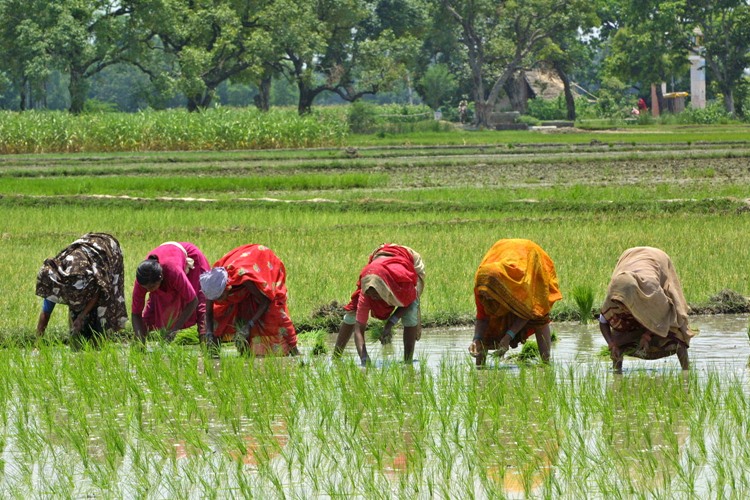Seeds of Resistance
Saving Seeds is a Political Act!

Women Say "Enough!"
Led by Vandana Shiva, and inspired by Mahatma Gandhi‘s concept of non-violence, the women of Navdanya refuse to obey international trade laws or heed the rules of market economy. How did the poorest and most underprivileged group in India--women farmers--become activists? And how did something as tiny as a seed stir such controversy?
With the new laws in effect, multinational corporations, in particular Monsanto, patent seeds and sell them at high prices to small farmers. For these farmers, cost of production soars and profit margins decrease, often leading to hunger and bankruptcy.
Recently the Indian government reported that more than 25,000 farmers have committed suicide since 1997, two years after the patent laws had come into effect. However, their report named alcoholism and not indebtedness as the cause of the suicides. Shiva and women of Navdanyastrongly disagree.
Shiva believes that Indian farmers are finding themselves on the brink of a "crisis of extinction" because the patent laws discriminate against them and benefit corporations. The paradox, she says, lies in the fact that women farmers, today's consumers of patented seeds, are the ones responsible for developing them in the first place.
"Women have been seed experts, the seed breeders, seed selectors, the biodiversity conservers of the world. And if today we have seeds that we can save, if today we have communities that can tell us the unique properties of different crops and different seeds, it's because we've had generations of women not recognized as agronomists, not recognized as breeders, not recognized in any way as having knowledge. The 10,000 years of human expertise in feeding us is a women's expertise."
According to Shiva, corporations steal from farmers: "Most patents today are based on straightforward biopiracy, the theft of women's innovation of centuries." Farmers lose control over their means of subsistence because they're now dependent on the patented, genetically modified (GMO) seed: "A system where few companies control the seed supply is in effect a system of slavery for farmers. Where the freedom of seed disappears, the freedom of farmers disappears," says Shiva.
Revolution in the Rice Fields
Women of Navdanya are waging a multifaceted revolution. They are taking a stand for the environment by mobilizing farmers across India to refuse buying GMO seeds that are damaging Indian biodiversity. They are campaigning against the use of pesticides and herbicides. They are educating farmers on the benefits of native seeds. Finally, they have established 34 community seed banks across the country that preserve native Indian seeds and distribute them at no cost to all interested farmers.
They have also started an economic revolution. They have mobilized some 10,000 farmers to disobey international trade agreements India has signed and create their own independent markets. Small farmers organized by Navdanya have shut corporations out of their fields, are using their own native seeds, and growing food for subsistence instead of monocultures for sale.
Finally, Navdanya's ecological and economic revolution is political in nature. The women have organized some 35,000 Indian villages into declaring themselves "biodiversity republics." These republics are organized around the principle of "living democracy," meaning democracy that is participatory and values sharing, community and the environment. Whereas Indian economy is governed by free trade, these republics are pockets of fair trade and economic independence.
Shiva has been accused of being naïve and quixotic. Some argue that it is not possible to sidestep the market system and the World Trade Organization (WTO). They say traditional systems of farming and trade belong to the past and are not plausible in today's globalized world. Primarily, the dissenters argue that ancient systems of farming cannot successfully feed today's one billion starving people.
Shiva, however, refuses to budge. She points out that the reason so many people are going hungry is unjust trade relations and not organic farming based on diversity. She calls for a complete revision of the WTO agreements so that the interests of farmers are taken into consideration. Finally, she calls for a return to an economic and political system grounded on sharing and not on profits and private property, one based on women's knowledge, women's traditions and women's legacy:
"The women of India have evolved two hundred thousand rice varieties, work done over millennia by hundreds of thousands of unknown grandmothers. At no point did any one of those women turn around and tell her sister, 'Now I have bred this new rice. Now onwards, it is my property; now onwards you will pay me royalties.'"
Citations taken from Vandana Shiva's lecture at the University of California at Santa Barbara entitled "Planting the Seed for Change: Women's struggle against Corporate Control of Biodiversity" (August 1, 2004) as well as articles published on Navdanya's official Web site.

